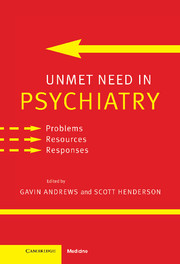Book contents
- Frontmatter
- Contents
- List of Contributors
- Preface
- Part I Unmet need: defining the problem
- Part II Unmet need: general problems and solutions
- Part III Unmet need: people with specific disorders
- Part IV Unmet need: specific issues
- Introduction
- 22 Unmet need in mental health service delivery: children and adolescents
- 23 Assessing psychopathology among children aged four to eight
- 24 Unmet need in Indigenous mental health: where to start?
- 25 Health systems research: a pragmatic model for meeting mental health needs in low-income countries
- 26 Disablement associated with chronic psychosis as seen by two groups of key informants: patients and mental health professionals
- 27 The assessment of perceived need
- 28 Public knowledge of and attitudes to mental disorders: a limiting factor in the optimal use of treatment services
- Part V Unmet need: conclusion
- Index
23 - Assessing psychopathology among children aged four to eight
from Part IV - Unmet need: specific issues
Published online by Cambridge University Press: 21 August 2009
- Frontmatter
- Contents
- List of Contributors
- Preface
- Part I Unmet need: defining the problem
- Part II Unmet need: general problems and solutions
- Part III Unmet need: people with specific disorders
- Part IV Unmet need: specific issues
- Introduction
- 22 Unmet need in mental health service delivery: children and adolescents
- 23 Assessing psychopathology among children aged four to eight
- 24 Unmet need in Indigenous mental health: where to start?
- 25 Health systems research: a pragmatic model for meeting mental health needs in low-income countries
- 26 Disablement associated with chronic psychosis as seen by two groups of key informants: patients and mental health professionals
- 27 The assessment of perceived need
- 28 Public knowledge of and attitudes to mental disorders: a limiting factor in the optimal use of treatment services
- Part V Unmet need: conclusion
- Index
Summary
Introduction
Although changes in mental health care financing are occurring globally, little data are available on the effect this may have on access to treatment, treatment outcome, and services themselves. What is known is based on adult data; thus, the impact of health care reform on children and adolescents is largely unknown. To improve service availability and treatment of mental disorders for children and adolescents, we need to know more about the cost of treating childhood disorders, and the barriers to accessing that care. This begins with knowledge of the number of children and adolescents who ‘need’ services, and the proportion of those ‘in need’ who receive mental health services.
Assessing need
Need is defined in several ways: from receiving mental health care, to functional impairment, to meeting criteria according to standardized DSM or ICD criteria (Costello, Burns, Angold & Leaf, 1993). Estimating need based on service use requires: (1) a system of care that documents in a standardized way the symptoms that are experienced by children and adolescents; (2) valid data collection; and (3) a clear understanding of all service arenas used by children and adolescents. Knowing how to identify the repertoire of service agencies and providers in all regions of a country is one of the major difficulties of defining need as ‘use of services’. In the USA, services related specifically to children typically include those received through the social welfare office, and visits to a juvenile justice program, a counselor at school, a psychologist, primary care provider or a psychiatrist. Data show that approximately 1% of children receive mental health services in mental health settings (Burns & Friedman, 1990) and approximately 6% receive services related to mental health within the primary care and school systems (Costello, 1989; Horwitz, Leaf, Leventhal, Forsyth & Speechley, 1992).
Keywords
- Type
- Chapter
- Information
- Unmet Need in PsychiatryProblems, Resources, Responses, pp. 345 - 355Publisher: Cambridge University PressPrint publication year: 2000



